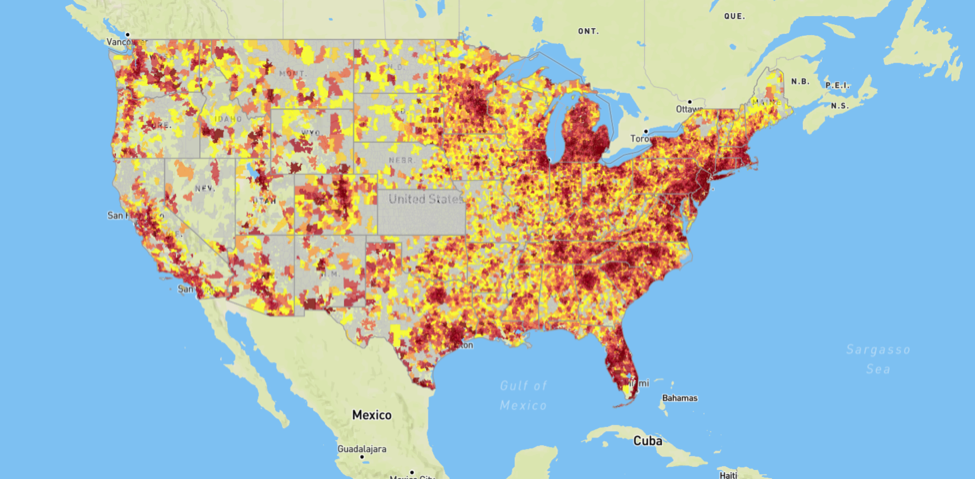
January 29, 2026
By Adjoa Kyerematen
National Minority Quality Forum Launches COVID Care Club, a New Patient Network Addressing COVID-19, Long COVID, and the Ongoing Impact of Misinformation
Read More

For Immediate Release
6 April 2021 | Washington, DC
POWERFUL NEW TOOL PREDICTS COVID TRENDS
The COVID Index Is Like a Weather Forecast to Prepare the Public for Oncoming Storms
WASHINGTON, D.C.— Today, National Minority Quality Forum (NMQF) announced the launch of its COVID-19 Index (https://covidindex.ai-healthnet.com), a powerful new tool designed to prepare communities for future waves of coronavirus.
The COVID-19 Index will enable healthcare organizations and communities to view where coronavirus cases and deaths will surge so they may focus their resources on those areas most directly impacted by the virus. This ability to predict the future will improve response times for businesses and government agencies, as well as allow healthcare providers to prepare for an increase of expected patients who may need COVID-19 treatments.
“We have reached a place where predictive analytics will guide decisions to keep our diverse communities safe from the threat COVID, diabetes, cancer, or sickle cell,” said Gary A. Puckrein, Ph.D., President and CEO of NMQF.
For example, one application of the COVID-19 Index is a map of localized viral trends that forecasts viral surges before they reach a critical stage. Organizations will use this map to concentrate their risk mitigation efforts—such as messaging around mask use, social distance, hand washing, and vaccine administration—where most needed. Localizing the contagion will lead to more effective management of resources.
An additional application is the layering of monoclonal antibody infusion centers onto the map, which will show eligible high-risk patients and potential patients in surging areas where they can seek treatment. As COVID-19 antibody medicines have shown to be most effective when administered close to diagnosis, having this information available in advance will help inform a COVID-19 preparedness plan, should one be needed.
“At Regeneron, we share the National Minority Quality Forum’s commitment to ensuring equitable access to COVID-19 resources, including public health information that will help prevent the spread of disease and novel COVID-19 medicines in case people do end up becoming infected,” said Leah Lipsich, Ph.D., Vice President of Strategic Program Direction at Regeneron.
“We are proud to support the new COVID-19 Index and help equip communities—particularly minority and underserved communities who have been disproportionately impacted—to reduce the potentially devastating effects of this disease. The use of historical data and predictive modeling, combined with the power of scientific discovery that has led to effective and well-studied new vaccines and medicines, will help end the COVID-19 pandemic.”
The COVID-19 Index integrates historical data beginning in March 2020 with data sets from public and private sources. This combination of forecasts and historical data is available by ZIP code and higher geographies (state, county, metropolitan statistical areas, and congressional and state legislative districts) and is presented in a variety of easily accessible formats:
disease-specific maps
weekly COVID Report
webinars
podcast
infographics
tweets
APIs
chart books
other summary analyses
Each of these formats offers early warnings to safeguard the public and direct more efficient deployment of resources.
In launching the COVID-19 Index, NMQF is partnering with Regeneron (through an unrestricted grant), Congressional Black Caucus Institute, East Bay Community Foundation, Quest Diagnostics (a sponsor), Kaiser Permanente (a donor), National Infusion Center Association, The PepsiCo Foundation (a sponsor), Medtronic (a sponsor), Johnson & Johnson, and 17 minority-serving federally qualified health clinics (FQHCs) and community-based organizations (CBOs).
The FQHCs and CBOs are trusted messengers and advocates in their communities, dispelling disinformation, while taking on the risky task of testing for the virus and administering the vaccines. FQHCs and CBOs have provided NMQF with the ZIP codes of their service areas, and NMQF used those ZIP codes to map those service areas. The purpose was to give these partners foresight so they could be more effective advocates and purveyors of healthcare in their communities.
The COVID-19 Index also addresses the information desert that has contributed to the disproportionate impact of the virus on minority and underserved communities. Most public reporting on the virus does not provide actionable intelligence that could help those communities, adding yet another social determinant as underserved communities face additional challenges in understanding and lowering their risk.
In future iterations of the Index, NMQF will add filters that easily identify minority communities that are currently underreported in other COVID-19 reporting systems. These communities have experienced higher risks of infection, hospitalizations, and mortality. Yet, in the public provisioning of care, from vaccines to COVID-19 therapeutics, these communities were not prioritized.
“As part of our commitment to transforming a system that has denied opportunity and access to communities of color, the East Bay Community Foundation (EBCF),” says James Head, CEO of EBCF, “is delighted to be a part of a forward-looking initiative directing a needed resource to the people who have been hardest hit by COVID-19.”
The disadvantages were not isolated to the underserved, where episodes of hospitalizations and death were more pronounced; their community became a place where the virus found human carriers who transported the disease to more privileged areas. The COVID-19 Index creates the opportunity for public-private partnerships to geofence the virus, inhibiting its spread by changing the paradigm from prioritizing care for the privileged to what we know to be more effective infectious disease management.
“COVID-19 has had a disproportionate impact on African Americans. This project seeks to share accurate information by trusted messengers as it provides resources to communities of color in need. “Congressional Black Caucus Institute (CBCI)is looking forward to using, and sharing the Index,” says Vanessa Griddine-Jones, Executive Director at CBCI.
The COVID-19 Index is a harbinger of things to come, where we manage the health of our communities by our ability to forecast and to provision care based upon risk assessments—not privilege. Over the past year, we’ve seen the toll of using our bodies support the economy, with over 550,000 lives taken by COVID-19 in the U.S. The COVID-19 Index provides the insight we need to build the economy to support our biology.
Browse it now at https://covidindex.ai-healthnet.com
About the National Minority Quality Forum
The National Minority Quality Forum assists health care providers, professionals, administrators, researchers, policymakers, and community and faith-based organizations in delivering appropriate health care to minority communities. This assistance is based on providing the evidence in the form of science, research, and analysis that will lead to the effective organization and management of system resources to improve the quality and safety of health care for the entire population of the U.S., including minorities.
The Forum has developed a comprehensive database comprised of over 5 billion patient records, which it uses to define disease prevalence, costs and outcomes for demographic subpopulations by geography (Zip code, state, county, congressional and state legislative districts).
NMQF maintains GARI — a proprietary web-based geo-mapping and advanced research information system. GARI accesses over 5 billion patient records that powers collaborative learning communities (known as an index). Each index provides aggregated claims and related medical data to support academic research, advocacy, policy, and clinical applications.
Currently, NMQF publishes indices in many therapeutic areas, including rheumatoid arthritis, diabetes, heart failure, atrial fibrillation, sickle disease, lupus, and various cancers (such as breast, lung, prostate, and skin). These indices can be found at www.mypalc.org.
For more information, please visit www.nmqf.org.
Media Contact
Kelly Ann Collins
media@nmqf-pr.org
(202) 413-1187